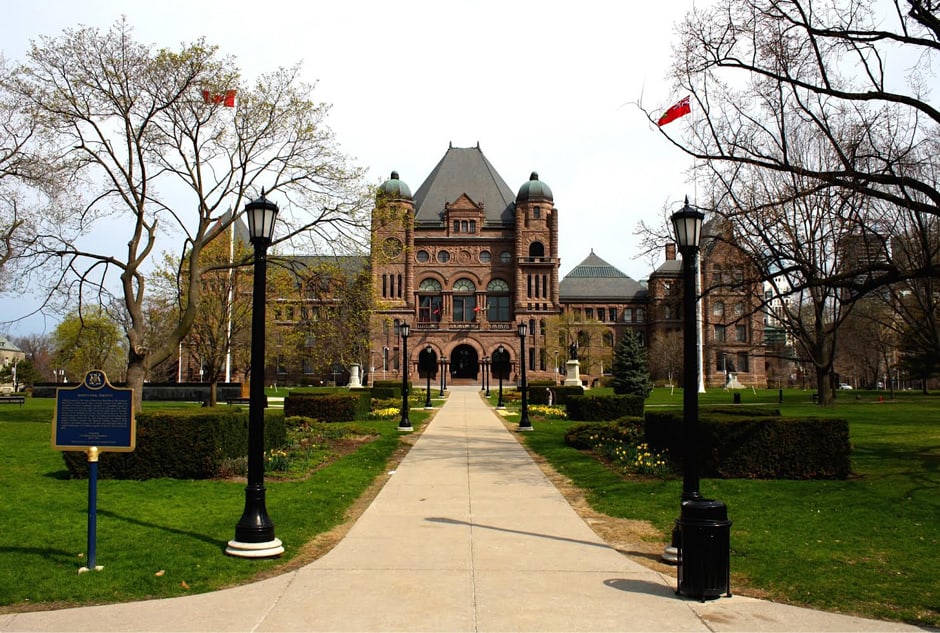Three months after receiving a mandate from the people of Ontario, Premier Kathleen Wynne has issued mandate letters to ministers in her cabinet.
While such letters, which give ministers and their departments instructions going forward, have long been a part of Ontario political life, the events of September 25 were different.
The letters were published publicly for the first time, a move in line with Wynne’s emphasis on transparency.
Reza Moridi, a nuclear physicist who serves as Minister of Training, Colleges and Universities, was challenged by the premier to lead from the often-referenced “activist centre” while looking through the “lens of fiscal prudence” with an eye to a balanced budget by 2017–2018.
The letter centres on preparing young Ontarians for the job market through programs, giving more high school students job experience, and placing an increased emphasis on the trades, while also improving the quality and availability of post-secondary education across the board.
Moridi highlighted his government’s record on the issue of availability and affordability, pointing out that average student debt for four-year programs has declined by 20.9 per cent since 2000–2001.
“Ontario offers one of the most robust student assistance programs in Canada… Once all government supports are factored in, the students with the greatest need pay substantially less and virtually no student pays the full sticker price,” Moridi said.
When asked how he would follow through on the letter’s pledge to make Ontario “North America’s leading jurisdiction for talent, skills and training” and draw international students, the minister implied that the government’s plan would be sufficient to realize this goal.
“These goals will help us ensure our colleges and universities are providing quality and innovative programs that speak to their strengths as an institution, through differentiation,” he said.
Moridi also mentioned the Ontario Youth Entrepreneurship Fund, another major part of the Liberals’ plan that aims to provide young Ontarians with access to investment and mentorship.
New Democratic Party (NDP) Training, Colleges and Universities critic Peggy Sattler saw it differently, and said that the government has not accounted for some of the logistical problems surrounding monetary assistance.
“We know the Ontario system of financial aid is overwhelmingly complex and difficult to navigate. To just assume students will figure out where to go to access which pots of financial aid creates more barriers for students already having to overcome barriers to access to post-secondary education,” Sattler said.
Ontario has the lowest per-student funding and the highest tuition fees in Canada.
On the jobs front, Sattler was also concerned that Wynne’s government will not do enough to crack down on unpaid internships, which have been an NDP priority since before the election.
For his part, Progressive Conservative Training, Colleges and Universities critic Garfield Dunlop saw the potential for fiscal issues and lamented a lack of specific dollar amounts in the letter. “[The biggest] problem we have today is funding levels. Where is the money coming from?” Dunlop said.
Dunlop also questioned the government’s commitment to transparency and accountability given their record on Ornge and the gas plant scandal.
Dunlop also said that publishing the mandate letter limited Moridi’s capacity for independent leadership. “It’s been dictated to him,” he said.
Glen Jones, professor of education at the Ontario Institute for Studies in Education and expert on federal and provincial university policy, looked on the administration’s goals more favourably.
“I think that the letter itself should be respected as a unique way of signaling government priorities emerging from the premier’s office and increasing transparency. We now know the Minister of Training, Colleges and Universities’ marching orders from the premier — and this is the first time that these mandate letters have been released,” he said.
Jones also praised the Ontario Liberal government’s efforts to increase access to post-secondary education, saying they have the best record of any administration in four decades.
“I am not sure that there is much [for university students] to disagree with. The letter sets out a series of goals that have already been articulated by government, but it also identifies goals like access and student financial support as key priorities,” Jones added.
Other stated aims in the letter include transferring funds from the least to most effective employment training programs and working with employers to assess the job readiness of graduates.


